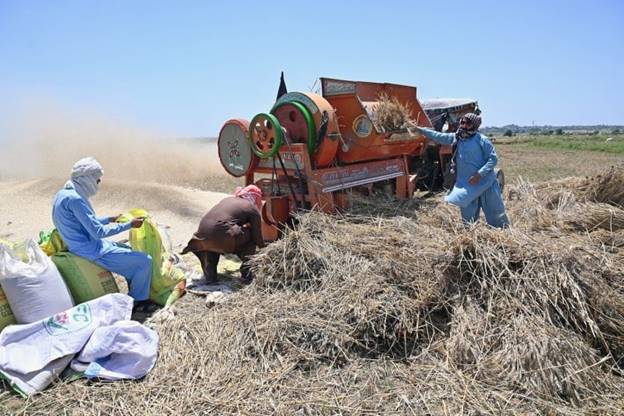
Farmers thresh wheat in a field on the outskirts of Islamabad on May 6 Farooq Naeem/AFP via Getty Images
Pakistan Seeks More IMF Funding Amid Protests
By Michael Kugelman
Washington, DC
Economic stress triggered violent protests in Pakistani-administered Kashmir last week. The unrest couldn’t have come at a worse time for Pakistan’s government. A senior delegation from the International Monetary Fund (IMF) arrived in Islamabad to discuss the possibility of a new, badly needed assistance package.
The IMF visit comes days after the fund released a report signaling concerns about Pakistan’s capacity to implement austerity policies and economic reforms. Some of these policies—including electricity hikes and withdrawn subsidies—are exactly what the protesters in Kashmir were rallying against.
Pakistan, which nearly defaulted last year, has achieved a measure of economic stability in recent months. An IMF package last year brought in much-needed revenue. Inflation has been cut in half, from 38 percent in May 2023 to a little more than 17 percent last month. Import control measures have eased the external account deficit, and interest from foreign investors has increased .
Still, the economy remains in crisis , saddled by serious debt and only expected to grow by 2 percent during the current fiscal year, which ends on June 30. And it’s hitting the public hard, as shown not only by the protests in Kashmir but also by farmers demonstrating against Islamabad’s bizarre decision to import wheat despite bumper harvests, which they say will result in a drop in prices—and thus profits.
Looming over all of this is the question of essential but elusive economic reforms. Pakistan’s economy has suffered from serious structural constraints for decades: a large but inefficient agricultural sector, an over-dependence on a sole export—textiles—that struggles to compete globally, heavy reliance on expensive hydrocarbon imports, insufficient tax revenue, and severely indebted public enterprises.
This means that Pakistan’s economy is vulnerable even in the best of times, and it takes devastating hits from external shocks—as was the case over the past few years after supply chain bottlenecks caused by the COVID-19 pandemic and Russia’s war in Ukraine.
Without reforms to address structural weaknesses, Pakistan’s usual tactics during economic crises—especially the pursuit of bailouts and other assistance—will only bring temporary relief before the next catastrophe hits. Today, the government’s strategy includes a new investment mechanism intended to attract capital from the Arab Gulf states and beyond, heavily influenced by Pakistan’s powerful army chief.
However, Islamabad insists that it’s committed to reform. The military backs the current government completely and likely had a major hand in starting the privatization process for Pakistan’s cash-strapped national airline earlier this year, a key reform agenda point. Past Pakistani governments have reneged on reform plans for political reasons given the powerful interests that resist them, from agricultural lobbies to entrenched bureaucracies.
Pakistan’s finance minister, Muhammad Aurangzeb , offers some hope. He is a banker rather than a politician, suggesting that he won’t be as vulnerable to these political pressures. But the government already appears to be undermining Aurengzeb, depriving him of key portfolios and giving more power to Ishaq Dar—a former finance minister and the current foreign minister.
Facing public anger as well as rejection from Pakistanis who say the country’s February election was rigged, the government may conclude that it lacks the political capital to pursue reforms. The military, which has vast holdings across many sectors, may eventually change tack if it fears that the changes would imperil its own economic interests. If Islamabad once again fails to undertake reforms, it would be more than just another missed opportunity.
This time around, the stakes are especially high. Pakistan is experiencing a worsening brain drain problem , with rising numbers of people leaving to work abroad, undermining a key potential economic asset—its large population. It also faces a surging terrorism threat that periodically targets foreign investments in the country. Further down the road, worsening climate change effects could wreak havoc on the economy, including the vulnerable agriculture sector.
Pakistan could reach a point where the costs of letting political expediency prevail over prudent economic policy become prohibitively high—for the economy, and for the country on the whole…
US counterterrorism cooperation with Pakistan. On Monday, the United States and Pakistan issued a joint statement at the conclusion of a bilateral dialogue that focused in part on shared concerns over the Islamic State-Khorasan (IS-K) and the Tehreek-e-Taliban Pakistan. The meeting was significant, given that the Biden administration has sought to reframe relations with Pakistan to focus more on nonsecurity issues since the US withdrawal from Afghanistan.
The United States is likely motivated by its growing concerns about IS-K, which in recent months has demonstrated an increasing capacity to project a threat well beyond Afghanistan, including in Europe. US officials want to explore new counterterrorism collaborations with Pakistan, which borders Afghanistan, IS-K’s main base.
Still, the possibilities are somewhat limited given that US security aid to Pakistan has been suspended since 2018. Notably, the joint statement mainly spoke of cooperation beyond funding and weapons, including capacity-building initiatives such as police training as well as assistance with investigations and prosecutions…
(Michael Kugelman is the writer of Foreign Policy ’s weekly South Asia Brief. He is the director of the South Asia Institute at the Wilson Center in Washington. – Foreign Policy)

